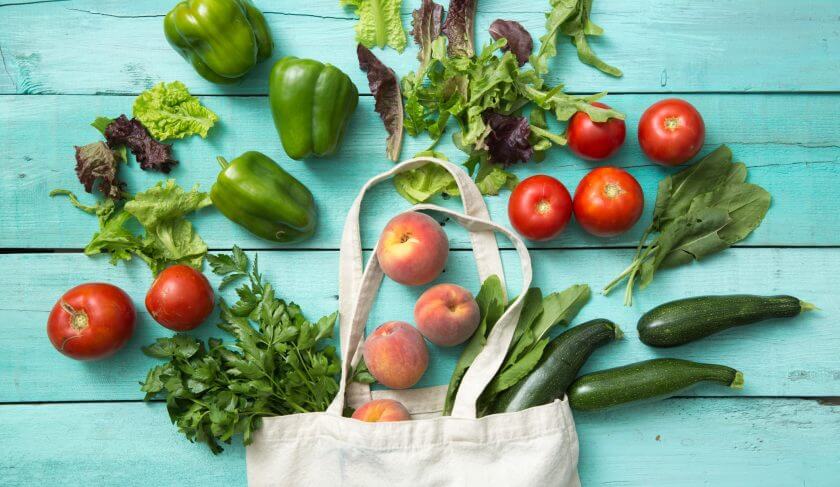
The pandemic’s disruption to U.S. food supply chains is on full display at the grocery store. Shoppers empty the shelves just as quickly as supermarkets restock high-demand items like non-perishable foods, cleaning supplies and, of course, toilet paper.
Waiting in line to enter your local grocery store or clicking through pages of Amazon search results isn’t the only way to find what you need, however. We asked food industry experts for advice on finding the essentials in stock.
Shop for grocery staples at local restaurants
Restaurants may have stopped dine-in services, but some have augmented their take-out programs by selling pantry items. Restaurants usually buy from wholesale food suppliers, and right now many of them have excess inventory that they’re more than happy to part with.
Ranch 45 in Solana Beach, California has found some success with the restaurant-as-pantry model. The business is even considering continuing to sell grocery items post-pandemic.
“We still had access to items like milk, eggs and meat when the stores ran out,” says Ranch 45 co-founder Pam Schwartz. “The ranch we get our chicken from has closed, but we were able to find another alternative.”
Purchase in bulk from wholesale
When schools, stadiums, restaurants, and other places of public gathering were forced to close, wholesale companies lost a large portion of their client base. That’s left retailers like Sam’s Club and Costco with plenty of available food for purchase. Non-perishable things like pasta, flour, yeast and canned goods abound.
A word of caution: Piper Davis, host of food podcast Mouthy, says you’ll be getting bulk quantities of items when you buy wholesale, like, a 50-pound bag of flour suitable for a professional baker’s needs. Piper’s suggestion: Go in with friends and share bulk items.
Buy fresh produce directly from farmers
Produce is still well-stocked at grocery stores, but there are advantages to buying directly from farms. Items are fresher since there are fewer steps in the supply chain. When you buy name brand produce from a grocer, it’s “been planted, fertilized, grown, picked, washed, packaged, transported merchandise all by different people,” Davis says. But when you buy from a farm, one grower or family may have done all of that, in a much shorter time frame.
Consumers can get farm fresh produce from farmers markets (many are open now for strolling, or for pickup orders placed in advance), stopping by a local farm, or ordering community supported agriculture (CSA) boxes. These are boxes of produce and other goodies that can be shipped directly to your door from local farms.
Turn to janitorial suppliers for precious TP and other paper products
There’s a couple caveats with this tip: As is the case with buying from wholesale companies, these products are typically offered only in bulk quantities. So make sure you have somewhere to store items before placing an order.
Also, not all janitorial companies are going to have the same cushy name-brand TP you’re used to buying at the store. For instance, some of the only toilet paper products in stock at suppliers like Clean It Supply and Total Restroom are those jumbo-sized, two-ply rolls you’d usually find in public restroom stalls. Nice if you’re in a pinch, but maybe not great for the long haul.
Note that janitorial suppliers may also have other paper products in high demand and low supply at regular stores, like paper towels and napkins.
Heat up a ready-to-make or frozen meal from your favorite restaurant
According to chef Alia Jaziri of restaurant Medina in San Diego, California, many restaurants are selling both pre-cooked, portioned dishes that can be either eaten immediately or frozen for later, as well as pre-packaged raw ingredients that you can whip up yourself into your favorite “copycat” dish. Jaziri’s restaurant will be doing this in the weeks to come, she says.
The move benefits both restaurants and consumers: Restaurants are able to minimize waste, keep some staff employed and keep inventory moving and fresh. Consumers get their favorite meals to cook or simply enjoy whenever they want.
Order food subscription boxes (but prepare for a possible wait)
With the boom in popularity of subscription boxes, you can find a plethora of services that deliver meal prep items, produce, dairy, coffee, wine and more directly to your door. Some, like Imperfect Foods, might have a waitlist to get started. With the mission of reducing food waste, Imperfect Foods ships misshapen produce and other grocery items that may have gotten thrown away due to surplus, mis-labeling, or because it’s “ugly.”
“We and other grocers across the country have seen an unprecedented spike in demand for grocery delivery because of COVID-19,” wrote an Imperfect Foods spokesperson via email. “We’re putting new customers in certain areas on a waitlist as we continue ramping up operations and growing our team to keep up with demand.”
As is the case with many things during quarantine, consumers may need to alter their shopping habits in order to get what they need. The change might be inconvenient, but it leads us to discover more about our food supply system, and alternatives we might like even better than what we find on the shelves.
More from HerMoney:
- 8 Quarantine Cooking Essentials
- 9 Things Most of Us Don’t Do at the Grocery Store But Could Save Us $100 or More
- Podcast: The Lazy Woman’s Guide to Cooking With Melissa Clark
Looking for more financial insights delivered right to your inbox? Subscribe to HerMoney today!







